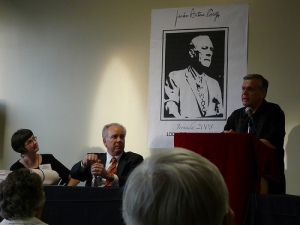This is cross-posted from Education Policy Blog.
So once again two "former governors from different political parties who remain passionate about the quality of education in America" (Chicago Tribune,
Perspective, May 3, 2009) have weighed in with a grand proposal about how Arne Duncan should use his "$5 billion to transform education in America" to "improve student achievement and ultimately revolutionize our economy and workforce for the 21st century."
Neither Jeb Bush nor James B. Hunt Jr. have any background in the field of education, other than being governors. Neither has ever been a teacher, principal, superintendent (although it's possible Hunt had some personal knowledge of education, having majored in college in "agricultural education"--although he seems to have gone on and immediately got a masters studying how to raise tobacco better, oh, and within two years of college was also studying law--he only failed the bar exam the first time--and was, according to all of biographies I can find on the Web, "an early proponent of teaching standards," and married a teacher, although she quit her job as teacher to become full-time first-lady--can't blame her for that!). Yet because they are "passionate" about "the quality of education in America," and because they believe themselves (implicitly) to offer a balanced perspective (being, after all, "from different political parties"), they think they know how best to spend that money.
Let's hope that Arne doesn't take their advice lock, stock, and barrel.
One of their ideas is truly innovative and would be a very good idea: create a national, free, repository of world-class online educational opportunities where "students, parents, teachers, principals, and school administrators" (and former governors?!?) "could shop for a better education. Virtual courses open to everyone would tear down the chief barrier to student achievement--access to a quality education." Well, that certainly is ONE barrier to student achievement, and it could be reduced through such a national repository. The two former governors liken it to "an Amazon.com of courses and curricula." I don't really think that's the correct analogy, but there might be some worth in using an interface like Amazon's, including user ratings and reviews. I'd prefer an analogy like the American Memory project of the Library of Congress (which makes public domain and other archival materials available with a simple-to-use interface), of learning objects. (While learning objects might include "courses and curricula," we need to dramatically broaden our conception of what kind of content would provide the most useful "access to a quality education"--and "learning object" is a good, neutral, non-confining conception.) Add on a Web 2.0 type of access system (including the folksonomy of tags, ratings, personal profiles, sharing, etc. on the order of Diigo or De.lic.i.ous) and this is a wonderful, doable idea. Just make sure that you've got teachers involved, because teachers DO know some things that "former governors" do not, about motivation, the influence of culture and peer pressure, and the importance of appropriate scaffolds for each individual learner. Because "access to quality education" isn't just a matter of making it available on the Amazon-courses-repository.com. In fact, "access" is, at best, half of the solution to making sure every student gets a quality education..."access" depends, in large measure, on the student having both the interest in the resources and the skills or guidance necessary to use it appropriately...two factors that aren't magically in place once something is available online!...a point that is obvious to anyone who has actually poked around on the Web and realized what is ALREADY available there, to those who know what they want and how to find it.
The other suggestions made by these "passionate" "former governors" (who, of course, are therefore the most qualified to know what can "improve student achievement"...just look at all the positive gains that former governors have produced in American students during the past 20 years when "former governors" have been so front-and-center in reform efforts!) make are kind of laughable, not only because we've heard them all before, but because they are proffered with such complete naivete about how familiar they have become. Schools should have "comprehensive data systems," so that we can use the "test scores" of a whole "class" to "tell us whether a teacher is effective" and "an entire state of test scores" to "tell whether a policy is working." "When empirical data replace emotion as the basis for developing policy, America will be able to transformt he quality of education into a world-class system of learning." GOLLY! What a new idea!!!! Get rid of that most human of characteristics--emotion--and that most human of activities--education--will suddenly become as efficient and effective as the "world class" automobile industries America has created using the mantra of Total Quality Management and Continuous Improvement!!
(Wait! Haven't these "empirical" systems of management been used in corporate America for decades!?!? Have they made our industries "world-class"? Has the evisceration of emotion from business resulted in the dramatic increases in quality that these "former governors" (passionate--mind you!) predict for the schools??!?)
(Yesterday, I was at a keynote address at the National-Louis University's Center for Practitioner Research Forum, given by Karen Gallas, whom I really liked. Karen, of course, got way, way, WAY, too caught up in emotion, when she talked about how the kindergarteners she was teaching on the Navaho reservation responded so directly to her efforts at forming close relationships with them, but only showed "bald-faced defiance" to her attempts to use authority...and about how these kids could only really be brought into a cooperative group when Karen came to her wit's end and began quietly singing "Little Rabbit Foo-Foo" to herself in the middle of a chaotic classroom. I don't recall hearing Karen talk about the relationship of this "out of the blue" inspiration to just sing with "empirical data" or even "comprehensive data systems." In fact, now that I think about it "passionately" (like these former governors...WAIT! they don't want passion...they want DATA), Karen was WAY too emotionally involved in her job, and with her students, to possibly be effective with them. Damn emotion....get it OUT of schools and classrooms!!! There's the ticket!!!)
But I digress from describing these, um, tired and worn out reform suggestions. In addition to more comprehensive data systems and more empirical data and (God willing!) less emotion, these passionate (um, emotional? No, of course not, these guys are totally empirical....um, except of course they ignore the record of the, um, "success" of these reform suggestions...I guess maybe the demand for "empirical data" doesn't apply to "former governors" writing op-eds in national newspapers....)
But I digress again. The suggestions!!! "Making progress toward rigorous college-and career-ready standards and assessments". (WOW, there's a new idea). "Making improvements in teacher effectiveness" (hmm....like the improvements in the quality of American automobiles...yes? Let's model teacher education programs after corporate quality assurance programs! Yes!) Oh, and "providing intensive support and effective interventions for the lowest-performing schools." (Oooooh, yeah, there's the ticket! More requirements for direct instruction in those skills measured on the tests....more shutting down those schools that are dysfunctional...more reconstitution of schools requiring every staff member to re-apply so we can replace the veterans with wet-behind-the-ears recruits who will toe the line and parrot our "world class" curriculums and (by the way) let's make sure the principals of the reconstituted schools get the power to force at least a third of the recalcitrant STUDENTS out, too!). Oh, and creating a market for quality teachers by paying them more! (Hmmm.....I actually like that one....it appeals to my sense of the importance of teaching, especially in difficult schools...but, um, is that really based on empirical data...or is that an emotional response to the visceral sense I have that good teachers are worth their weight in gold....oh, I GET IT...the demand for "empirical data" to replace "emotion" is only required in those cases where emotion somehow conflicts with the corporatization of schooling!!! Aha! Why don't the former governor's just SAY THAT?!?!
"PASSIONATE FORMER GOVERNORS--FROM BOTH PARTIES--CALL FOR FURTHER CORPORATIZATION OF AMERICAN SCHOOLS" -- now there's a headline that speaks the truth!!!
Hmmm, clearly, I've let my emotions run away from me. Back to the data...um, what data? There's no data in this piece. There's just a string of cliches about the (clearly obvious...no need for data here) ways that schools will (WILL, we say!) be improved by applying corporatist management strategies to schools.
Then there's the call for the national online learning object repository and Web 2.0-like user-created-folksonomy access system (using my language for it). The former governors write "let's stop tinkering around the edges of reforms and really revolutionize the way we deliver knowledge to students." (You know, the way that FedEx and UPS have "really revolutionized the way we deliver" parcels to people. I think we need bar codes on the students' foreheads....no, really, that will help!) (No "tinkering around the edges...MORE DATA SYSTEMS!!!)...."Learning is no longer local, yet we still operate in a system ruled by traditonal course work and antiquated textbooks."
Hmmmm..... "learning is no longer local"? What? Where's the data for that claim, gentlemen? Methinks you might be confusing two things: (1) the globalization of the kinds of things we want our kids to learn, and (2) the locus of ALL learning, which is in the hearts and minds of individual students (Sorry, no hearts...can't have that emotion)...in the MINDS of individual students.
Huh? Wait. We're trying to get that "individual" part out of there, aren't we??!? Education should assume (ASSUME!) that "learning is no longer local." And, of course, that means getting rid of "traditional course work and antiquated textbooks". Well, yeah, that would be good. And replace it all with a NATIONAL ONLINE CAMPUS OF VIRTUAL SCHOOLS! Yes!!! All of them stripped, if possible, of anything emotional or local. After all, this isn't about individual people! It's about transforming America's educational system!!!
Damn. I'm just overwhelmed with how much sense this makes. Kids not learning?!?! They clearly need more standards and more tests. And get rid of those veteran teachers using those traditional methods. We need those Navajo kindergarteners to get online, and get learning. Put them in Blackboard! (Or, better, Amazon.com!) Then they'll learn!!!
Just to make sure you understand how "passionate" they are, these former governors end their provocative perspective piece with a reminder that "The world has entered into an education arms race. The winners will be the countries that prepare their students will the knowledge and skills to scucess in the increasingly cometitive global marketplace. Science, math, engineering...these fields of study are the breeding ground of innovation and the fountainhead of prosperity."
O.M.G. We're back in 1957. Sputnik has launched, and our nation better be gear up for an "education arms race." Gotta get those scientists educated. Gotta be steely-eyed about this. No emotion. Facts!
Culture? Motivation? Interest? Relationships? Critical thinking?!??!
None of that is important.
We're at war, and we must act. Passionately. Doing the same things we've been trying to do for years. But working harder.
And without emotion, please.







